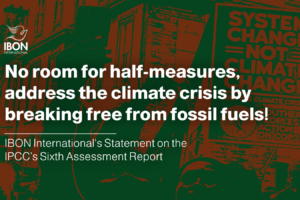IBON Statement on the Cancun Climate Summit
Despite the optimism placed on them, the Cancun Agreements of the 2010 UN Climate Summit do not represent a success for multilateralism; neither do they put the world on a safe climate pathway that science demands, and far less to a just and equitable transition towards a sustainable model of development. They represent a victory for big polluters and Northern elites that wish to continue with business-as-usual.
The Agreements’ two main planks – the outcomes of the Convention and Kyoto Protocol negotiation tracks – merely anchor the pledges in the Copenhagen Accord into the UN climate process, and promise to continue talks on Kyoto’s second commitment period until 2011 in South Africa.
This means there is still no certainty on the future of Kyoto – the only legally-binding instrument for mitigation, whose first round lapses 2012, and which big developed countries such as the US and Japan have in word or deed abandoned – despite the fragile pledge to keep talking and ensure the first and second rounds of cuts carry on seamlessly.
This also means that the unjust Copenhagen Accord – which progressive governments and movements fought tooth and nail inside and outside the talks – is now firmly installed in the UN process, this time in official and more elaborate form.
In terms of mitigation architecture, the Agreements set up a pledge-and-review system that exempts the largest historical polluter US from taking on Kyoto-style obligations, while tasking poor countries to submit their mitigation actions to reporting and international analysis. Cancun is a step closer to the dismantling of the wall of equity and historical responsibility that has heretofore set apart Southern obligations from those of the North, despite the North’s failure to keep their end of the bargain.
They further water down the North’s emissions commitments by installing a REDD mechanism that make forest removals of carbon count to meeting obligations, and further risk the violation of rights of forest-dependent communities.
In terms of mitigation ambition, the very low level of emissions cuts pledged from last year remain so to date and if implemented could lead to catastrophic warming of 3-4°C by 2100. The 2°C limit to warming the Agreements set is dangerously conservative, and lowering it to 1.5°C in 2013 through review would be too late. Global emissions will have to drop to zero by 2050 for the world to have any chance to return to 350ppm by 2100.
In terms of finance, the Agreements lock in the Copenhagen Accord pledges of raising $30 billion over 2010-12 and $100 billion by 2020, which do not only fall short of poor countries’ needs, but will also come from non-mandatory public and private sources, including carbon offsetting and double-counted aid. The Agreements establish a Green Climate Fund but invite the World Bank to be its interim trustee, despite the Bank’s lack of democracy and transparency, and its long record of ecologically harmful lending.
Without certainty on the finance side of things and without relaxing stringent global intellectual property rules restricting free technology transfer, the Adaptation Framework and the Technology Mechanism the Agreements create will have little broad impact.
The Agreements also flash the green light on the eligibility of risky carbon capture and storage projects to receive carbon offset credits, giving polluters more ways to ‘meet’ commitments without abandoning carbon-based fuels and technologies.
Finally and most importantly, the Agreements are not grounded on a commitment by governments to steer the world in a new direction – towards a model centred on ending poverty, improving the quality of life, and ensuring basic material and social needs for all, rather than on endless growth, corporate accumulation, and overconsumption of the few.
We have little time left to accomplish a just and sustainable transition and the planet cannot wait for the foundering international negotiations to work. The ball is now in the hands of peoples, communities, and social movements in the North and the South to mobilize to resist big business, push governments, build alternative systems, and set the world on the path to sustainability from the ground up.



